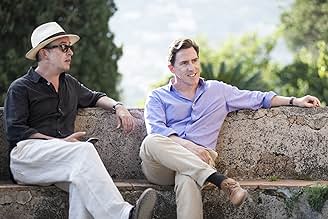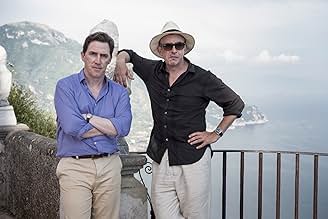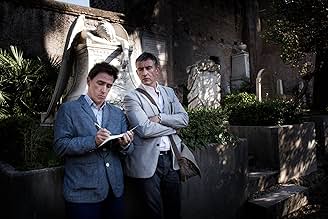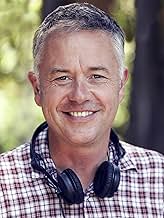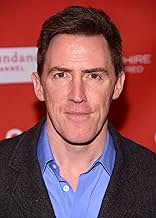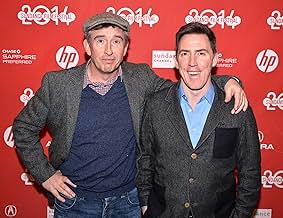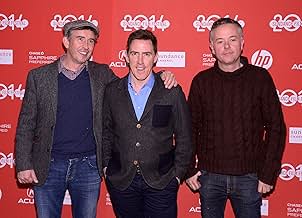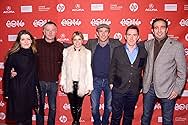CALIFICACIÓN DE IMDb
6.6/10
16 k
TU CALIFICACIÓN
Dos hombres, seis comidas en seis lugares diferentes en un viaje por carretera por Italia.Dos hombres, seis comidas en seis lugares diferentes en un viaje por carretera por Italia.Dos hombres, seis comidas en seis lugares diferentes en un viaje por carretera por Italia.
- Premios
- 1 nominación en total
- Dirección
- Guionista
- Todo el elenco y el equipo
- Producción, taquilla y más en IMDbPro
Opiniones destacadas
The Trip to Italy is a sequel to the little known, little seen 2010 film The Trip, which in itself is a highlight reel of a little known, little seen BBC miniseries of the same name. Each reiteration of this franchise, I guess you could call it, feels like the rotating lenses of a microscope, filling in more detail while getting ever smaller in scope and appeal. Who exactly is this movie for? I'm not quite sure but whoever is on its wavelength will probably have a ball.
The Trip to Italy revisits Steve Coogan and Rob Brydon as they are once again conscripted by the London Observer to eat at and review multiple restaurants. This time instead of driving through the foggy moors of Northern England, the duo drive their rented Mini Cooper through the sunny coasts of Italy. While doing so they once again trade witty repartee, relight professional rivalries and whip out their best Michael Caine impressions.
Its basically the same setup as the first only the location and power dynamic between our two leads is a bit more interesting. Coogan's star seems to have taken a dip since the cancellation of his American TV series. Meanwhile the less misanthropic Brydon is being courted by director Michael Mann for a billed part in a crime drama. Insecurities and the specter of aging into obsolescence abounds in this sequel, and the Italian countryside and tales of the Romantics serve beautifully as a stark juxtaposition.
Director Michael Winterbottom takes every opportunity to indulge in the sun and scenic poetry of Italy. As the characters retrace the steps of the romantics, Winterbottom takes delight in lifting visual cues from mainstay international cinema such as the bumpy road trips of Il Sorpasso (1962), the luxurious schooners of Purple Noon (1960) and the general feeling of ennui from La Dolce Vita (1960). As the film wears on, the actors become entrenched in a background literally alive with history, unable to make their pithy comments take you out of the beauty (though it's not for lack of trying.
Yet the same things that bogged down The Trip from being the best version of itself are still purposely present in Trip to Italy. There are the same insufferably self-centered characters, the same conversations and improvisational impressions, the same inattention to the freaking food! Seriously, I realize that oafish behavior set against the truly beautiful is partially the point but how do you NOT make Italian food the center of attention? Thankfully the two surly actors have much more to interact with. Actresses Marta Barrio and Rosie Fellner actually show up to dinner instead of being relegated to bits of cellphone asides. Steve's son (as played by Timothy Leach) shows up as well allowing us to see how two middle-aged men in a perpetual existential crises handle being around a child for a few minutes.
Overall Trip to Italy is in my mind a smidgen better than its predecessor and only because it trades temperate gloom for Mediterranean sunniness. But if you're the type who finds the fields, fog and verdant bluffs of England more appealing then the opposite might be true for you. Regardless, your ability to take this trilogy (so far) is wholly dependent on your ability to stomach two actors winging-it while sitting across from one another. I personally found my patience eroding by the minute.
The Trip to Italy revisits Steve Coogan and Rob Brydon as they are once again conscripted by the London Observer to eat at and review multiple restaurants. This time instead of driving through the foggy moors of Northern England, the duo drive their rented Mini Cooper through the sunny coasts of Italy. While doing so they once again trade witty repartee, relight professional rivalries and whip out their best Michael Caine impressions.
Its basically the same setup as the first only the location and power dynamic between our two leads is a bit more interesting. Coogan's star seems to have taken a dip since the cancellation of his American TV series. Meanwhile the less misanthropic Brydon is being courted by director Michael Mann for a billed part in a crime drama. Insecurities and the specter of aging into obsolescence abounds in this sequel, and the Italian countryside and tales of the Romantics serve beautifully as a stark juxtaposition.
Director Michael Winterbottom takes every opportunity to indulge in the sun and scenic poetry of Italy. As the characters retrace the steps of the romantics, Winterbottom takes delight in lifting visual cues from mainstay international cinema such as the bumpy road trips of Il Sorpasso (1962), the luxurious schooners of Purple Noon (1960) and the general feeling of ennui from La Dolce Vita (1960). As the film wears on, the actors become entrenched in a background literally alive with history, unable to make their pithy comments take you out of the beauty (though it's not for lack of trying.
Yet the same things that bogged down The Trip from being the best version of itself are still purposely present in Trip to Italy. There are the same insufferably self-centered characters, the same conversations and improvisational impressions, the same inattention to the freaking food! Seriously, I realize that oafish behavior set against the truly beautiful is partially the point but how do you NOT make Italian food the center of attention? Thankfully the two surly actors have much more to interact with. Actresses Marta Barrio and Rosie Fellner actually show up to dinner instead of being relegated to bits of cellphone asides. Steve's son (as played by Timothy Leach) shows up as well allowing us to see how two middle-aged men in a perpetual existential crises handle being around a child for a few minutes.
Overall Trip to Italy is in my mind a smidgen better than its predecessor and only because it trades temperate gloom for Mediterranean sunniness. But if you're the type who finds the fields, fog and verdant bluffs of England more appealing then the opposite might be true for you. Regardless, your ability to take this trilogy (so far) is wholly dependent on your ability to stomach two actors winging-it while sitting across from one another. I personally found my patience eroding by the minute.
This is a real smart movie.. Taking your rhythm and anxiety to a very peaceful zone, restore your serinity.. I admit, it's a bit boring.. But this is the idea.. Sort of relaxation you should surrender to the stream and give up your regular thoughts about love, sex, excitement, show Biz, etc.. Just let the sun shine on your face.
I encourage to make it series movies, but don't be so specific in the dialogue to movie biz, make it more rich to suit other people and different occasions.. Maintain the slow rhythm and ambience.. No music is a good idea.. Nature and scenes are suburb and sufficient glamorous.. Great GREAT!! I FOUND MYSELF PAYING FULL ATTENTION DURING THE PLAY..
As with their first "The Trip", I've had ambivalent feelings about these Coogan/Brydon travel/food/comedy serials. This new series follows much of the first.
If you loved the first, that's good news. But the program is a mixed bag to where you really have to call out the good and the bad.
First, the good. Coogan and Brydon have a great personal chemistry that comes off in the series as something unscripted. The locations are gorgeous, and the soundtrack adds to the grandeur of place. The series is also somewhat groundbreaking in introducing a genre of travel-food- comedy, which has its merits.
The restaurants featured in the series are researched and quite extraordinary. And the literary trail of the likes of Byron and Shelley add a cultural relevance to the program where, I would have to say, I would enjoy partaking in such a Magical Mystery Tour myself.
Next, the bad. If you removed the impersonations of Michael Caine, Sean Connery, etc., 70% of the program would be on the cutting room floor. There are few themes of humor in the program, and they are mercilessly beaten to an absolute pulp. Can you imagine spending a week-long vacation in Italy with a friend who basically ran the same gag everywhere you went?
This makes the program the Beavis & Butthead of the BBC set. If the gag gets old or doesn't work for you, the show has little else to offer you besides a few good visual scenes with the sound turned off.
Like the Magical Mystery Tour, the show's arc comes off as rather aimless and without a real destination. If the joy is in the travel, and some of it is, that would be one thing. But if there's no joy in bad impersonation banter of actors from years gone by, there's too much to redeem itself.
As a whole, the program offers glimpses of creative ideas and possibilities while failing to execute to their potential. Injecting an actual scriptwriter might have seemed anathema to the program's vision and goals, but there are few programs I've seen this year that so sorely could have improved with just one decent writer.
If you loved the first, that's good news. But the program is a mixed bag to where you really have to call out the good and the bad.
First, the good. Coogan and Brydon have a great personal chemistry that comes off in the series as something unscripted. The locations are gorgeous, and the soundtrack adds to the grandeur of place. The series is also somewhat groundbreaking in introducing a genre of travel-food- comedy, which has its merits.
The restaurants featured in the series are researched and quite extraordinary. And the literary trail of the likes of Byron and Shelley add a cultural relevance to the program where, I would have to say, I would enjoy partaking in such a Magical Mystery Tour myself.
Next, the bad. If you removed the impersonations of Michael Caine, Sean Connery, etc., 70% of the program would be on the cutting room floor. There are few themes of humor in the program, and they are mercilessly beaten to an absolute pulp. Can you imagine spending a week-long vacation in Italy with a friend who basically ran the same gag everywhere you went?
This makes the program the Beavis & Butthead of the BBC set. If the gag gets old or doesn't work for you, the show has little else to offer you besides a few good visual scenes with the sound turned off.
Like the Magical Mystery Tour, the show's arc comes off as rather aimless and without a real destination. If the joy is in the travel, and some of it is, that would be one thing. But if there's no joy in bad impersonation banter of actors from years gone by, there's too much to redeem itself.
As a whole, the program offers glimpses of creative ideas and possibilities while failing to execute to their potential. Injecting an actual scriptwriter might have seemed anathema to the program's vision and goals, but there are few programs I've seen this year that so sorely could have improved with just one decent writer.
After laughing along with Brydon and Coogan savaging their own vanities and all of life around them, I found some of the reviews here to be more comical than the film. It's as if "The Trip to Italy" totally escapes them, probably much to the two main actors' amusement. The beauty of the ridiculous and sometimes lame impressions belies that the two are not trying to be serious travel/food hosts but two comics riffing on the idiocy of the business they are in .. and much more. This is satire, not some boring Anthony Bourdain exploration of food and culture. It's two goofy guys making fun of themselves. That so many people miss that simple point boggles my mind.
I'm a huge fan of Michael Winterbottom's work which is fully on display in this modest travel journal of two friends discovering the joys of Italy. Steve Coogan & Rob Brydon, the friends in question, I'll admit are an acquired taste; one that I've not yet...acquired. I kept resisting the urge to just mute the sound so I didn't have to listen to their inane, extremely irritating, babblings was only because Strauss and Mahler were used expertly on the soundtrack. And who would want to miss that? The food, the scenery and an undefined longing are all very appealing. But the self-centered mugging by the two, which we're clued to think is adorable by women, I just think needs a warning to any viewer. Try to shut them out. 'Cause they never shut up.
¿Sabías que…?
- TriviaLike the previous film, The Trip (2010), Rob Brydon and Steve Coogan improvised their scenes together.
- ErroresToward the end of the movie (33 minute to the end), they are showing and commenting about a fruit they call "kumquat" which is in fact a "Physalis" also called "Cape Gooseberry", a fruit originally from Chile and Peru. A Kumquat is like a miniature orange, which can be eaten whole, or used in making marmalade. It has a very sharp flavour. A physalis has a paper-like husk like a tomatillo and is very sweet when ripe.
- ConexionesEdited from The Trip (2010)
- Bandas sonorasAll I Really Want
Written by Glen Ballard and Alanis Morissette
Published by Bucks Music Group Limited on behalf of Penny Farthing Music; Universal/MCA Music Limited
Performed by Alanis Morissette
Licensed courtesy of Warner Music UK Ltd.
Selecciones populares
Inicia sesión para calificar y agrega a la lista de videos para obtener recomendaciones personalizadas
- How long is The Trip to Italy?Con tecnología de Alexa
Detalles
- Fecha de lanzamiento
- País de origen
- Sitios oficiales
- Idiomas
- También se conoce como
- 享受吧!尋味義大利
- Locaciones de filmación
- Villa Cimbrone, Ravello, Italia(Terrazzo dell'lnfinito)
- Productoras
- Ver más créditos de la compañía en IMDbPro
Taquilla
- Total en EE. UU. y Canadá
- USD 2,880,537
- Fin de semana de estreno en EE. UU. y Canadá
- USD 71,712
- 17 ago 2014
- Total a nivel mundial
- USD 6,132,875
- Tiempo de ejecución
- 1h 48min(108 min)
- Color
- Relación de aspecto
- 1.85 : 1
Contribuir a esta página
Sugiere una edición o agrega el contenido que falta



